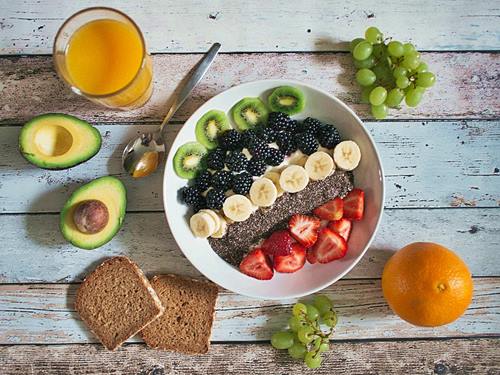Breakfast, skip, or eat?
Eat a good breakfast to lose weight
Fact Checked
×All the content published in our website is fact checked to validate its accuracy.
Visit our guidelines web page to learn more about our strict processes regarding how we review our content's sources: reliable and reputable journals, media websites, universities, colleges, organizations, and professionals.
Our articles are based on scientific evidence, and the references are included in its footnotes, which are clickable links to sound scientific papers.
First published: 07.Dec.2018
Breakfast eaters are leaner. Learn why
Breakfast is quite a controversial meal especially for those who are trying to lose weight.
Some skip it, believing that by doing so they will cut out a large chunk of their daily calorie intake and therefore, by increasing their caloric deficit, lose more weight.
Others, follow the weight loss maxim first put forward by a famous American nutritionist:
Eat Breakfast Like a King, Lunch Like a Prince, and Dinner Like a Pauper. Adelle Davis (1904-1974)
And most, eat a typical regular breakfast and wonder if it is healthy or not and if it will help you lose some pounds.
What does science have to tell us about breakfast and weight loss? Should you have it, or should you skip it and keep on fasting?
This article will review some recent scientific papers about the impact of breakfast in weight loss programs. Please, read on below.
References and Further Reading
(1) Brikou D, Zannidi D, Karfopoulou E, Anastasiou CA, Yannakoulia M, (2016). Breakfast consumption and weight-loss maintenance: results from the MedWeight study. Br J Nutr. 2016 Jun;115(12):2246-51. doi: 10.1017/S0007114516001550
(2) Dhurandhar EJ et al., (2014). The effectiveness of breakfast recommendations on weight loss: a randomized controlled trial. Am J Clin Nutr. 2014 Aug;100(2):507-13. doi: 10.3945/ajcn.114.089573. Epub 2014 Jun 4
(3) Hana Kahleova, Jan Irene Lloren, Andrew Mashchak, Martin Hill, Gary E Fraser, (2017). Meal Frequency and Timing Are Associated with Changes in Body Mass Index in Adventist Health Study 2. The Journal of Nutrition, Vol 147:9, 1 September 2017, 1722-1728, https://doi.org/10.3945/jn.116.244749
(4) Navia B, López-Sobaler AM, Villalobos T, et al. (2017). Breakfast habits and differences regarding abdominal obesity in a cross-sectional study in Spanish adults: The ANIBES study. PLoS One. 2017;12(11):e0188828. Published 2017 Nov 30. doi:10.1371/journal.pone.0188828
(5) Aparicio A, Rodriguez-Rodriguez EE, Aranceta-Bartrina J, et al., (2017). Differences in meal patterns and timing with regard to central obesity in the ANIBES ('Anthropometric data, macronutrients and micronutrients intake, practice of physical activity, socioeconomic data and lifestyles in Spain') Study. Public Health Nutr. 2017;20(13):2364-2373
(6) Zhang L, Cordeiro LS, Liu J, Ma Y., (2017). The Association between Breakfast Skipping and Body Weight, Nutrient Intake, and Metabolic Measures among Participants with Metabolic Syndrome. Nutrients. 2017;9(4):384. Published 2017 Apr 14. doi:10.3390/nu9040384
(7) Geliebter A, Astbury NM, Aviram-Friedman R, Yahav E, Hashim S., (2014). Skipping breakfast leads to weight loss but also elevated cholesterol compared with consuming daily breakfasts of oat porridge or frosted cornflakes in overweight individuals: a randomised controlled trial. J Nutr Sci. 2014;3:e56. Published 2014 Nov 13. doi:10.1017/jns.2014.51
(8) D G Schlundt, J O Hill, T Sbrocco, J Pope-Cordle, T Sharp, (1992). The role of breakfast In the treatment of obesity: a randomized clinical trial. The American Journal of Clinical Nutrition, Vol 55:3, 1 March 1992, 645-651, https://doi.org/10.1093/ajcn/55.3.645
(9) Vander Wal JS, Gupta A, Khosla P, Dhurandhar NV., (2008). Egg breakfast enhances weight loss. Int J Obes (Lond). 2008;32(10):1545-51
(10) B Keogh, J., and M Clifton, P. (2020).Energy Intake and Satiety Responses of Eggs for Breakfast in Overweight and Obese Adults-A Crossover Study. International journal of environmental research and public health, 17(15), 5583. https://doi.org/10.3390/ijerph17155583
(16) Duan D, Pilla SJ, Michalski K, Laferrère B, Clark JM, Maruthur NM., (2022). Eating breakfast is associated with weight loss during an intensive lifestyle intervention for overweight ⁄ obesity. Obesity (Silver Spring). 2022 Feb;30(2):378-388. doi: 10.1002/oby.23340. Epub 2022 Jan 20. PMID: 35048528
About this Article
Breakfast and weight loss, A. Whittall
©2024 Fit-and-Well.com. First Published: 07.Dec.2018. Updated 11.Nov.2024. Update scheduled for 11.Nov.2027. https://www.fit-and-well.com/diet-food/breakfast-and-weight-loss.html




